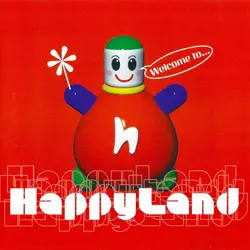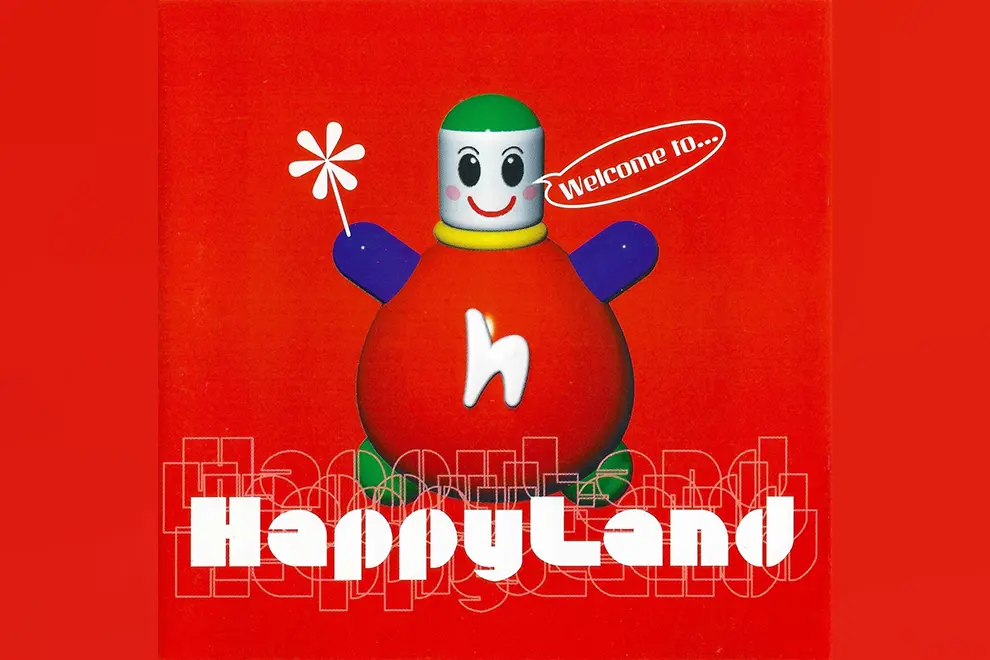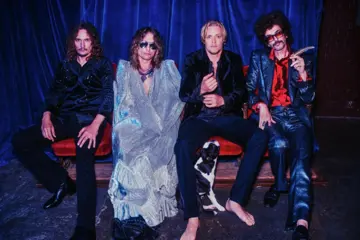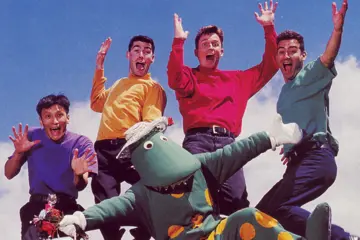 Happyland
HappylandIn 1999, Regurgitator and Spiderbait – two of the most revered Australian bands of the era – closed out the decade by releasing the follow-ups to their defining albums, Unit and Ivy & The Big Apples, respectively. Both bands did this with knowingly subversive and provocatively experimental albums, which resulted in the sugar-rush pop eclecticism of Spiderbait's Grandslam and the doubled-down eccentricity of Regurgitator's ...art.
Needless to say, these envelope-pushers challenged their freshly expanded audiences, eliminating the room of squares unwilling to go along. Neither sold as well nor produced a Polyester Girl or a Buy Me A Pony, but have since become viewed as among their most interesting, creative output.
Though obviously indebted to the sum of each trio's parts, the argument could be made that neither could have come to this point if members from both – Regurgitator's Quan Yeomans and Spiderbait's Janet English – hadn't made a detour into their own world en route. 25 years on from their first and only album, it's high time to revisit the pair's short-lived and crucially underrated adventure as Happyland.
Yeomans and English had written about their blossoming romance on previous albums: Spiderbait's Hot Water and Milk, sung by English, was widely believed to be about the couple – which was confirmed by the Gurge when they put Miffy's Simplicity on their debut album Tu-Plang.
Don't miss a beat with our FREE daily newsletter
The song not only lyrically name-checked the aforementioned Spiderbait track but also saw Yeomans sing about “running away” with his “geek love”. It seemed inevitable that the two would eventually find themselves making music together – which took place in 1997. After toying with names such as The Shampoodles and, hilariously, The Shits, the duo settled on Happyland and began work on what came to be known as Welcome To... Happyland.
It's somewhat telling they landed on a moniker that doubles as a fantastical place. Happyland is the sound of escapism – out of the realms of expectations placed upon Spiderbait and Regurgitator, outside of the strict borderlines of genre semantics.
Here, both Quan and Janet could be anything they wanted – meaning the artists we'd come to know throughout the 90s thus far could be entirely obfuscated. There are no photos or imagery of the two to be found anywhere within Welcome To... Happyland's artwork, nor in the music videos. When they played live, they wore animal costumes. It's their names in the liner notes, but that's merely a formality. This isn't an album by Quan from Regurgitator and Janet from Spiderbait – it's an album by two citizens of Happyland.
While residing in their own private universe, the pair could take on just about any sound, style or concept they felt like experimenting with. Perhaps the key examples of this freedom are found within Hunk'o Man and Ballad of Mike Katz. The former is a bass-driven groove that smash cuts into a head-banging big beat strut, while the latter is an atmospheric slow-motion dive into the unknown guided only by flanger-heavy drums and warbling layers of synthesizer.
English only makes her presence felt on Hunk'o'man through a chopped-up and distorted vocal sample, while Yeomans doesn't sing at all. The pair of tracks are instead united by an unlikely sample source: the 1977 bodybuilding documentary Pumping Iron, best known for introducing the world to a young Arnold Schwarzenegger.
Hunk'o'man pulls from Lou Ferrigno's dad offering advice to his son on how to pose, while Ballad closes with the titular Katz applauding fellow bodybuilder Ken Waller. Even Regurgitator, at their weirdest, probably wouldn't have had a clue what to do with such compositions, but in the hands of Happyland? It makes perfect sense.
When they do get around to singing, they make great use of their abstract environment. They daydream about a then-burgeoning childhood phenomenon (The Tale of Two Sea Monkeys), the great major-label buy-out of Australian alt-rock (Softly Contemporary) and even a pet chicken (Chicken). On the album's best-known song, the thrashing Don't You Know Who I Am?, English pushes her falsetto to its limit and completely sends up coke-fuelled industry excess and the delusions of grandeur that come with it.
Even though key moments feel like they stem directly from personal experience, particularly as the stars of Spiderbait and Regurgitator rose in the latter half of the 90s, the disembodied nature of the project allows both to shroud themselves in their computer-generated avatars and embrace the kind of anonymity neither had been afforded in years. This paradoxical nature is what makes Happyland such an enthralling experiment – and why it was inevitable the bubble would eventually burst.
Cutting back to 1999, Happyland shifts from a bustling metropolis to a ghost town. It's not helped by the fact English and Yeomans amicably split up; it's helped even less by the fact that when the advent of streaming arrives, Welcome To... Happyland is nowhere to be found. For many years, it lived on solely through cracked jewel-case CDs, low-quality YouTube rips and a DeviantArt group. Thankfully, that has since been rectified – but the fact that even the streaming numbers of Don't You Know Who I Am? pale in comparison to the main bands' big singles says a lot.
In 2023, there is every chance that fans of both bands have no idea that Happyland even existed – particularly younger fans, introduced by either a cool uncle or their once-wild Gen X parents. It's a shame because if more people had heard Welcome To... Happyland, they might just stumble across some of the most creative and inspired material either musician has ever put their name to.
25 years on from their original release, the album maintains its electric energy and revels in its idiosyncrasies. It dared to be different, provided an alternative to alternative rock and made the grass so green on the other side that it may as well have been astroturf. The best part? You're welcome to visit Happyland anytime you please.
















